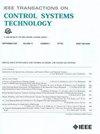电动自行车串联配置的舒适性能量管理及实验验证
IF 3.9
2区 计算机科学
Q1 AUTOMATION & CONTROL SYSTEMS
引用次数: 0
摘要
考虑到电动自行车固有的混合动力特性,他们需要能源管理策略(ems)来优化车辆中的能量和功率流。与传统的混合动力汽车(hev)相比,电动自行车面临的另一个挑战是人力能源。具体来说,人的力量是无法直接控制的,人的能量消耗是不容易测量和估计的。在这项工作中,我们解决了串并联自行车的能量管理,特别关注串联架构。具体来说,我们提出了一种以舒适为导向的EMS,可以间接控制人力,使骑自行车的人骑到他/她喜欢的操作点附近。为了实现这一目标,适当地扩展了等效消耗最小化策略(ECMS),以处理这种独特的场景。该方案在车辆控制单元(VCU)上实现;因此,当骑手出现在环路中时,通过实验验证证明了基于ecms的能量管理的有效性。结果表明,所提出的EMS保持其靠近首选操作点的行为会间接影响骑车人的操作点。本文章由计算机程序翻译,如有差异,请以英文原文为准。
Comfort-Oriented Energy Management for an e-Bike in Series Configuration With Experimental Validation
Given the intrinsic hybrid nature of electric bikes (e-bikes), they call for energy management strategies (EMSs), to optimize the energy and power flows in the vehicle. The additional challenge in e-bikes, compared to traditional hybrid electric vehicles (HEVs), is having a human power source. Specifically, human power cannot be directly controlled and his/her energy consumption cannot be easily measured or estimated. In this work, we address the energy management for a series-parallel bike, focusing in particular on the series architecture. In detail, we propose a comfort-oriented EMS able to indirectly control the human power to make the cyclist ride close to his/her preferred operating point. Toward this aim, the equivalent consumption minimization strategy (ECMS) is properly extended, to deal with this unique scenario. The solution is implemented on the vehicle control unit (VCU); therefore, the effectiveness of the ECMS-based energy management is proven through an experimental validation when the rider is present in the loop. Results show how the cyclist’s operating point is indirectly affected by the behavior of the proposed EMS keeping it close to the preferred operating point.
求助全文
通过发布文献求助,成功后即可免费获取论文全文。
去求助
来源期刊

IEEE Transactions on Control Systems Technology
工程技术-工程:电子与电气
CiteScore
10.70
自引率
2.10%
发文量
218
审稿时长
6.7 months
期刊介绍:
The IEEE Transactions on Control Systems Technology publishes high quality technical papers on technological advances in control engineering. The word technology is from the Greek technologia. The modern meaning is a scientific method to achieve a practical purpose. Control Systems Technology includes all aspects of control engineering needed to implement practical control systems, from analysis and design, through simulation and hardware. A primary purpose of the IEEE Transactions on Control Systems Technology is to have an archival publication which will bridge the gap between theory and practice. Papers are published in the IEEE Transactions on Control System Technology which disclose significant new knowledge, exploratory developments, or practical applications in all aspects of technology needed to implement control systems, from analysis and design through simulation, and hardware.
 求助内容:
求助内容: 应助结果提醒方式:
应助结果提醒方式:


